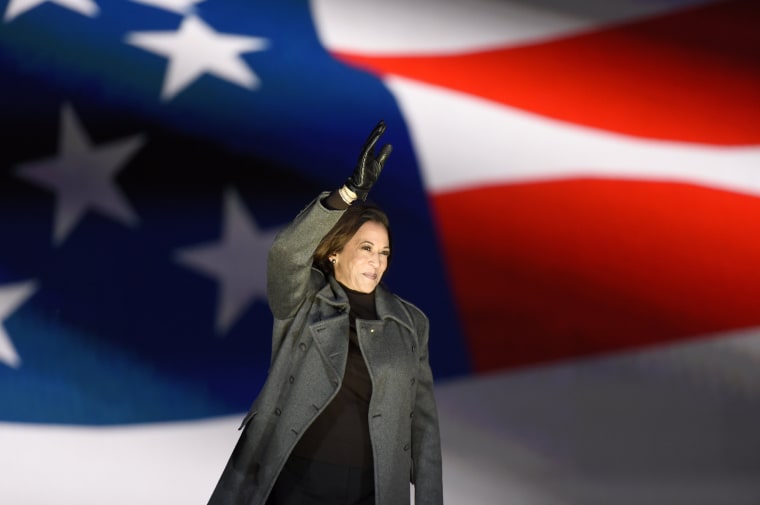Finally: It is not a dream, and Kamala Harris is the vice president-elect of the United States.
For American women, a glass ceiling — first tapped by Geraldine Ferraro in 1984 — has finally broken. For both Black and South Asian women in the United States, we felt it shatter on our first real hit; she is our sister. We see in her the promise that our mothers held out for us, one our grandmothers could not even imagine. For our daughters and granddaughters, we see a brighter future.
Most important, we see the beginnings of change at the highest level of governmental office in America — one that is long overdue.
Want more articles like this? Follow THINK on Instagram to get updates on the week's most important political analysis
Joe Biden's selection of Kamala Harris as his running mate was not just about a symbolic choice to win votes; it was a recognition that, in America, there are millions of competent women who are reasoned and reasonable, intellectual and emotive, engaging and analytical.
Black women like Harris have been the backbone of the modern Democratic Party.
Kamala Harris represents what America should have seen long ago in women, had the media and politicians not lost their way by coddling those far too eager to put women back in the kitchen and in the nursery. Our cultural imaginations can now be turned to all the women who every day work hard, succeed and are capable of running America.
Black women like Harris have been the backbone of the modern Democratic Party, from Fannie Lou Hamer's standing up for the Mississippi Freedom Democratic Party at the 1964 convention to Shirley Chisholm's run for the Democratic nomination in 1972 to Stacey Abrams' run for governor of Georgia and her creation of Fair Fight to protect voting rights. With Vice President Harris, their trailblazing political activism opens up a whole new range of opportunities for women organizing and being active through politics.
Her role also makes a very clear statement to the Democratic Party that its future is about Black women and other women of color who can draw voters into the fold, willing to fight and make changes that are important both for their communities and for America as a whole.
Harris' story will also resonate with the millions of recent immigrants who came to America to find jobs and education and to raise their children to be successful. Her successes are also the successes of immigrants and all people of color in America who have had to fight all kinds of racist and sexist odds to rise to the top of their professions and politics.
And after the last four years of performative femininity — often characterized by straight-ironed hair, professional makeup, pastels, bell sleeves and pussy bows — Vice President Harris will be a welcome breath of fresh air to many women for whom that vision of womanhood is anachronistic. Instead of stilettos, Chuck Taylors will be the rage; instead of tight sheath dresses, we can take a few deep breaths — as well as a hearty welcoming laugh — in a professional blazer.
Kamala Harris is a competent holder of power, exhibiting both strength and compassion.
It might seem shallow to talk about the change in sartorial choices with a changing presidential administration, but the way women in power dress is an important cue about how they view their own accessibility and the role of women in public life. Harris represents women who work hard, play hard, enjoy life and are committed to both career and family — and she will be accessible because she is casually professional and beautiful, not contrived.
Most important, Kamala Harris is a competent holder of power, exhibiting both strength and compassion — qualities she showed both as a senator and on the campaign trail. I looked forward to her Senate cross-examinations of congressional witnesses and her incisive way of cutting to the chase with her questioning. Women are often expected to pull back, to couch their words, to contain their ability to pounce; she does none of that. (Her "I am speaking" moment with Vice President Mike Pence during their debate spoke to women everywhere who have had to put up with condescending men who are trying to silence them.)
Her strength, however, does not mean that she will be imperious — far from it. Her ability to connect with crowds and to be fully herself without apology or contrivance is an asset for Joe Biden, particularly coming after an administration full of women who felt like foils for a president so uncouth that he begged suburban women to like him.
It will be tempting for many to brush off Harris' vice presidency as another exercise in representational politics. But she is more than a symbol to women, to Black people and to South Asian people: She is a woman who has risen to the top despite all that racism, sexism and the combination thereof have thrown at her. It is amazing to think that, finally, many Americans can look at the second-in-command of this country for the first time and say: "I see you. I feel you. I am like you."
During the campaign, Harris selected "Work That," by Mary J. Blige, as the song she walked out to at events; in it, Blige — an inspiration to Black women throughout her career — sings: "Feeling great 'cause the light's on me / Celebrating the things that everyone told me / Would never happen but God has put his hands on me / And ain't a man alive could ever take it from me."
Work that, Vice President-Elect Harris. You've earned it.
Related:



